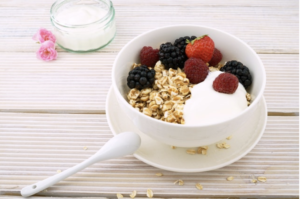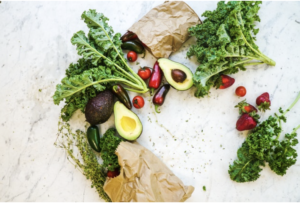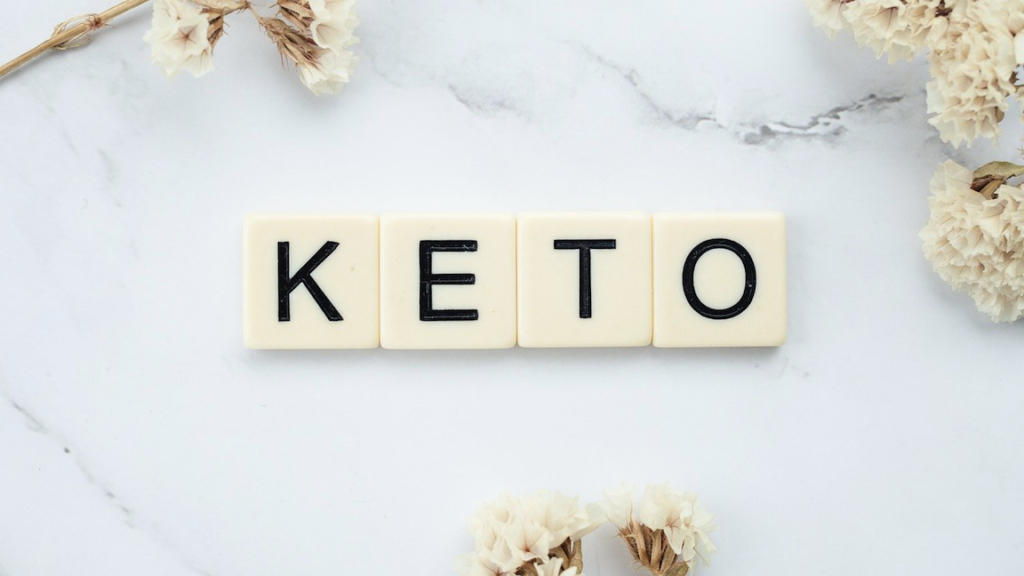What is Keto?
The ketogenic diet, also known as the keto diet or ketosis diet, is by far one of the most popular diets around. This is most likely due to its quick weight loss benefits and the fact that you’re still able to eat high fat foods and desserts as long as they don’t contain large amounts of carbs or sugar. So, I’m sure you’re wondering how the heck this is possible? It’s all thanks to a biological process called ketosis. This is when the body uses “fat-based” ketones as an alternative source of fuel rather than “carb or sugar-based” glucose.
What most people don’t realize is that the keto diet is not only beneficial for weight loss, but it’s also beneficial to the brain and thereby mental health. Keto is known to help the body retain oxygen, which is why some athletes have adopted this diet to help them achieving peak performance.
What is Ketosis
Normally our body runs on glucose as its main source of fuel. The liver converts carbohydrates to glucose which is sent out to the body to use as fuel. Any excess glucose is converted to glycogen and stored for future energy consumption.
Alternatively, the keto diet starves the body of glucose, thereby forcing the liver to use ketones as its main source of fuel. The presence of ketones means that your body has begun to convert to ketosis. This can be measured by urinating on a ketone test strip. The body uses fatty acids from foods or from our body fat to create ketones. This is why people burn fat so easily on the keto diet.
In ketosis, the body is burning fat for energy rather than carbohydrates. Ketones also act as a super fuel for the brain. They require less oxygen than glucose, thereby making utilizing fuel more efficient. Ketosis also releases less byproduct in the process, so your body doesn’t have to use extra energy to clean it up. This means you’ll feel more energetic throughout the day and your body can use the extra energy for healing and regenerating itself.
To The Point - Benefits of The Keto Diet
- A reduction in appetite, insulin, and water weight
- Increased levels of good HDL cholesterol
- Stabilizes blood sugar levels
- Helps with epileptic seizures, Alzheimer’s, dementia, anxiety, autism, bipolar, and ADHD
- Being in ketosis can help improve cognition, memory, clarity, alertness, and focus
- Increases oxygen retention within the body
- Reduced inflammation
Benefits of The Keto Diet
- A reduction in appetite, insulin, and water weight which can all help with weight loss. You’ll have less of an appetite, which means you’ll be eating less food. Less water retention helps reduce bloating giving you a slimmer look.
- Increased levels of good HDL cholesterol due to the increased consumption of healthy fats. People have the misconception that the keto diet is high in animal fats and other saturated fats. The keto diet actually only consists of 20% animal fat and this could come from leaner protein or fatty fish, such as salmon. If done properly, the keto diet creates healthy cholesterol levels by encouraging health fats vs unhealthy fats.
- Stabilizes blood sugar levels – Constantly eating foods high in sugar and carbohydrates cause your body to keep pumping insulin, resulting in fluctuating blood sugar levels. When you eat simple carbohydrates, you experience a sharp increase in blood sugar, followed by a sharp decrease. Your levels are usually not consistent throughout the day. When you’re super hungry, you can experience sharp reductions in blood sugar. This causes your brain to freak out thinking it’s going to starve. Incorporating a keto diet can help reduce blood sugar levels, which can benefit those with mood disorders and diabetes. *Those with diabetes should always monitor their blood sugar and insulin levels to ensure they don’t experience hypoglycemia (extremely low blood sugar levels).
- Helps with epileptic seizures, Alzheimer’s, dementia, anxiety, autism, bipolar, and ADHD. Being in ketosis can help improve cognition, memory, clarity, alertness, and focus. Ketones act as a super fuel for the brain. They require less oxygen than glucose, thereby making utilizing fuel more efficient. Ketones also use less byproduct in the process, so your body doesn’t have to use extra energy to clean it up. When glucose is used by the brain, it releases a byproduct called glutamate. When kept in check, glutamate plays a crucial role in memory and learning. However, excessive amounts of glutamate can contribute to over excited nerve cells, which can lead to cellular damage. This can have a negative impact on the nervous system, thereby contributing to neurological disease. It can also contribute to brain fog, insomnia, anxiety, and lack of focus. The keto diet keeps glutamate at healthier levels, while increasing ketones. This helps with the production of GABA, which plays a crucial role in the nervous system.
- Increases oxygen retention within the body. Now going back to glucose vs. ketones for energy production. Ketones are a more efficient means of energy use in the body. They are known to increase mitochondria, which is responsible for producing cellular energy. Less oxygen is needed to produce energy, meaning there’s more oxygen retained in your body. Your body can now spend this extra energy on healing and regenerating itself. When your brain is lacking oxygen, you can become irritable, stressed, anxious, and cognition can be impaired. Increased oxygen to the brain would promote clarity, focus, and relaxation. Studies have shown that someone in ketosis can hold their breath longer than someone not experiencing ketosis. This might be due to the fact that ketosis reduces the amount of carbon dioxide in the blood. Oxygen is needed to get rid of carbon dioxide, so less would be necessary to get the job done. As a result, ketosis leaves more oxygen for the brain. This is why a professional athlete would benefit from a ketosis diet. Having more body oxygen allows you to perform better physically and mentally.
- The keto diet reduces inflammation by eliminating sugars, processed foods, processed grains, starchy vegetables and other unhealthy fats and carbohydrates. Instead, you’ll be eating healthy anti-inflammatory foods rich in polyunsaturated fats. Some keto foods include eggs, avocados, olive oil, coconut oil, fatty fish, kale, cauliflower, broccoli, blueberries, and raspberries. Inflammation is an important tool that the body uses to fight injury, infection, bacteria, and viruses. However, if inflammation remains in the body for a long period of time, it can wreak havoc throughout the body, causing infection, disease, sickness, depression, anxiety, Alzheimer’s, auto-immune diseases, dementia, Parkinson’s, cancer, and more.
In a nutshell ...
By incorporating a keto diet, you can experience appetite reduction, insulin reduction, water weight reduction, increased good HDL cholesterol, stabilized blood sugar levels, increased oxygen, increased relaxation, improvements in focus, mental clarity, cognition, increased energy, and less inflammation. It can also help protect you against degenerative diseases and other mental health challenges.
Why wouldn’t you want to do this diet, right? Yeah, I get it. Easier said than done. But for those of you determined to give it a try, here’s how you can do it.
What Can You Eat on a Keto Diet
Start by reducing your carbohydrate count progressively, while simultaneously incorporating more healthy fats and low carb vegetables. One thing to note is that a lot of people have this idea that the keto diet consists of mostly meat, which is not the case at all. The diet should consist of 20% protein, 75% fat, and 5% carbohydrates. Here’s a snapshot of what your diet should look like.

Keto Diet Foods
Protein 20% – Chicken, eggs, turkey, salmon, shrimp, and bacon
Fat 75% – Avocado, walnuts, hazelnuts, almonds, olive oil, coconut oil, butter, MCT oil, yogurt, kefir, cheese, and nut milks, such as almond milk, coconut milk, and macadamia nut milk.
Carbohydrates 5% (<50 grams per day) – Cauliflower, zucchini, kale, spaghetti squash, butternut squash, blueberries, raspberries, and strawberries.
Keto Snacks

- Celery and almond butter
- Yogurt, raspberries, blueberries, and chia seeds, sweetened with stevia and inulin.
- Chocolate blueberry milkshake – Cacao powder, almond or coconut milk, almond butter, and a small amount of blueberries, sweetened with stevia and inulin.
- Chocolate strawberry frozen yogurt – Cacao powder, yogurt, and a small amount of strawberries, blended and sweetened with stevia and inulin.
- Blueberry yogurt frappe – yogurt sweetened with stevia, topped with blueberries, cinnamon, and shaved almonds or keto friendly granola.
- Raw Chocolate peanut butter balls – Peanut butter, cacao, cacao nibs, almond flour, inulin and stevia.
- Cauliflower crusted grilled cheese
- Cauliflower crusted pizza with mushrooms and olives
- Halo keto ice cream *Don’t overdo it with keto ice cream due to its high saturated fat content.
- Low carb rutabaga fries instead of potatoes
- Homemade tortilla chips with guacamole – made out of almond flour, almond meal, shredded cheese and paprika.
- There are plenty of prepackaged keto snack options available, although they have a high price tag. Try to get creative and make these things yourself if you’re on a budget.
Keto Vegetables

- Leafy greens like kale, lettuce, spinach
- Cauliflower
- Avocado
- Cucumber
- Zucchini
- Broccoli
- Brussel Sprouts
- Asparagus
How Long Does It Take To Enter Ketosis?
Once you begin to consume less than 50 grams of carbs per day, you should expect to enter ketosis within 2 – 4 days, although it’s different for everyone. Some people may take a week or longer.
If you’d like to jump start ketosis, try doing a 1 – 3 day keto fast. A keto fast may include the following: Day 1: just water, day 2 – 3: eating less than 20 grams of carb per day. Then you can move it up to 50 grams of carbs per day.
You can also combine the keto diet with intermittent fasting, meaning you fast for a certain number of hours throughout the day. The most common intermittent fasting is the 16 / 8 method, meaning you fast for 16 hours and only eat for 8. For example, you would stop eating around 6 pm the night before and then you wouldn’t eat anything until 10 am the next day. Intermittent fasting alone can help you lose weight quickly and potentially keep it off due the fact that you’re shrinking your appetite and keeping yourself fuller longer.
How To Calculate Net Carbs?
If you’re starting to hear more about net carbs, then welcome to the world of keto! If you don’t already know, they are the remainder of carbohydrates that are absorbed by the body. You can calculate net carbs by subtracting fiber and sugar alcohols from total carbohydrates. Sugar alcohols are a byproduct of sugar substitutes and are clearly labeled on all foods that contain them. Here’s how you calculate net carbohydrates:
NET CARBS = TOTAL CARBOHYDRATES – FIBER – SUGAR ALCOHOLS
Atkins Diet vs Keto
Atkins and the keto diet are both low carb diets, which makes them very similar. However, the main difference is that Atkins starts its first phase at 20 grams of carbs per day. Then you work your way up to 100 grams of carbs per day for as long as you want. Keto maintains a steady 50 grams of carbs per day for as long as you maintain the diet. This keeps the body in ketosis, meaning the body relies on ketones for fuel rather than glucose. Keto also limits protein to about 20% per day, while Atkins allows you to have as much as you want.
Is The Keto Diet Safe?
There are a few risks that can be associated with the keto diet, so talk to your doctor if you have any pre-existing conditions or are taking any medications. Here are some things to take into consideration:
- Kidney stress & kidney stones – People with kidney disease are usually advised to reduce their animal protein intake. Therefore, if you have any kidney related issues, you should avoid eating red meats while on keto.
- Diabetes and low blood sugar – Those with type 1 and type 2 diabetes should proceed with caution before beginning a keto diet. Although keto can help manage your blood sugar levels, there’s still a risk of hypoglycemia, which is a dangerous drop in blood sugar.
- Dehydration & a reduction in electrolytes – When the body uses fat instead of carbs for fuel, it produces ketones, which is expelled from the body through urine. Through this process, your body releases retained water and electrolytes to aid in the elimination. For this reason, you should drink plenty of water and consider supplementing with electrolytes while on the keto diet. You can find electrolytes in tomatoes and avocados.
- Decreased potassium levels due to a reduction in fruit, whole grains, and starchy vegetables. You should supplement your potassium through other low carb foods, such as almonds, avocado, spinach, salmon, flaxseed, and chia seeds.
- Decreased sodium – Ketosis releases less insulin, which causes your kidneys to eliminate more sodium. Make sure to add more sodium to your diet, especially if you’re sweating a lot during your workouts. You can simply add a pinch of pink Himalayan salt to your cup of water each day.
- High cholesterol and heart disease can develop as a result of the keto diet if you consume too much unhealthy saturated fats, especially trans fats, which are also known as hydrogenated oils. You should focus on healthy plant based unsaturated fats, such as avocados, olive oil, avocado oil, walnuts, almonds, and pecans. These healthy fats will actually help you fight high cholesterol and heart disease rather than increase it.
The keto diet can be very challenging to stick to. Just know that putting some effort into adopting a low carb diet can help improve your overall health. Just focus on limiting your carbs, sugar, and unhealthy fats, while increasing veggies, healthy grains, nuts, seeds and healthy fats. This alone should be enough for you to see a difference in weight loss, energy, physical and mental health, cognition, clarity, and focus.
To The Point - The Keto Diet
- The Keto diet is a low carb / high fat diet that consists of 20% protein, 75% fat, and 5% carbohydrates.
- ketosis is when body uses ketones for fuel rather than glucose. Our body uses fatty acids or body fat to create ketones, which is why you quickly burn fat on keto.
- Not only is the keto diet good for losing weight, but it’s also good for the brain. Ketones act as a super fuel for the brain due to its ability to retain more oxygen and energy in the body.
- Benefits of a keto diet include insulin reduction, water weight reduction, higher good HDL cholesterol, stabilized blood sugar levels, increased oxygen, increased relaxation, improvements in focus, mental clarity, cognition, increased energy, and lower inflammation.
- It may take between 2 – 4 days or longer to enter ketosis. The process can be expedited by keto fasting or intermittent fasting.
Learn more about Habitat for Wellness

